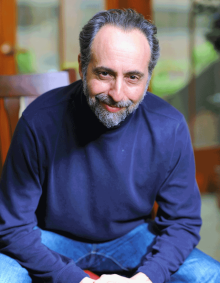Law Links - January 2016
Q&A with Professor Guyora Binder: a scholar, a teacher and an inquirer

A law school is only as strong as its faculty, and alumni support is crucial to attracting and retaining the best legal minds. One way this plays out is in the creation of named faculty positions.
We sat down with Professor Guyora Binder, who holds the title of Hodgson Russ Faculty Scholar, to ask him about that designation and about the body of work he has compiled since he joined the School of Law faculty in 1982. Binder also serves as vice dean for research and faculty.
Q: You’ve been on the faculty here for more than 30 years. What are the advantages and disadvantages of spending so much of your academic career in one place?
A: The advantage is the opportunity to build the institution. I’ve chaired the Appointments Committee 10 times and so participated in the hiring of most of our faculty by now. I’ve tried to carry on the legacy of the founders of our research faculty, New Dealers who had broadly interdisciplinary ambitions and wanted to train public servants. It’s a wonderful institutional identity that Buffalo has.
At the same time, if you don’t circulate in the broader academy, you can lose touch with new ideas. I’ve managed to avoid that by visiting at several other law schools – the University of Michigan, Stanford, Georgetown, Vanderbilt. Also, if you go to conferences and collaborate with people at other law schools, you can have the best of both worlds.
Q: What happens when you do a visiting professorship – is that time built around a research project?
A: Sometimes you’re going because you want to collaborate with somebody. Sometimes it’s to fill a teaching need. Sometimes, frankly, it’s other schools trying to recruit you.
In my role as vice dean for research and faculty I’m sort of a career counselor for other faculty, and I encourage them to go on visits. They can develop and get stimulation by moving from one job to another, but we’d rather they get that exposure and then come back to us.
Q: You are designated as the Hodgson Russ Faculty Scholar. What practical effect has that designation had on your situation?
A: The support from alumni and other donors to the law school for faculty scholarship is very important. In our first fund-raising campaign, which was started during the 1990s, this was one of our major goals. Pretty much every law school in the country that is at a research university incentivizes and rewards faculty scholarship by providing modest summer stipends. We didn’t have that, and this was important for us to be able to recruit strong faculty.
I was in charge of the faculty committee for that fund-raising campaign, and I wrote the case for support. Over the years, in that campaign and the current campaign, we’ve done that. Even modest support is a way of showing that the Law School, and its wider community of students and alumni and the legal community, support and are proud of the Law School’s research mission and the faculty’s achievements.
Q: How did you get interested in criminal law?
A: My interests have always been on the public law side. I’m interested in how we justify state power, and criminal law is the most dramatic exercise of state power, at least in the domestic sphere, that we have. During the years that I was in law school the Supreme Court at least temporarily abolished the death penalty, then it reversed itself, so there was a great deal of controversy about criminal punishment. My career has witnessed one of the most dramatic changes in American history, which is the dramatic expansion of the criminal justice system – the increase in the incarcerated population by about 600 percent. That’s a huge change in American social history.
Q: You’ve written widely in criminal law, including casebooks and teacher’s materials. How does one make the transition from scholarship to teaching?
A: I didn’t have any teaching experience. Just the other day I was at a reunion of the first class I taught, in 1982; they graduated in 1985, so this was their 30th reunion. They were telling me stories about things I did in the classroom that amused them in those first classes.
A teacher has to teach the material, but even more important than that, it seems to me, is stimulating their curiosity and enthusiasm. I think that it’s crucial for teachers to present themselves as part of the curriculum. What makes them passionate about what we’re all studying together? How do their own minds work? How do they deal with confusion? What do they do when they don’t know?
Q: What do you do for fun?
A: I’m a passionate and slightly better than mediocre tennis player. Now that I live in the city, I play in Delaware Park.